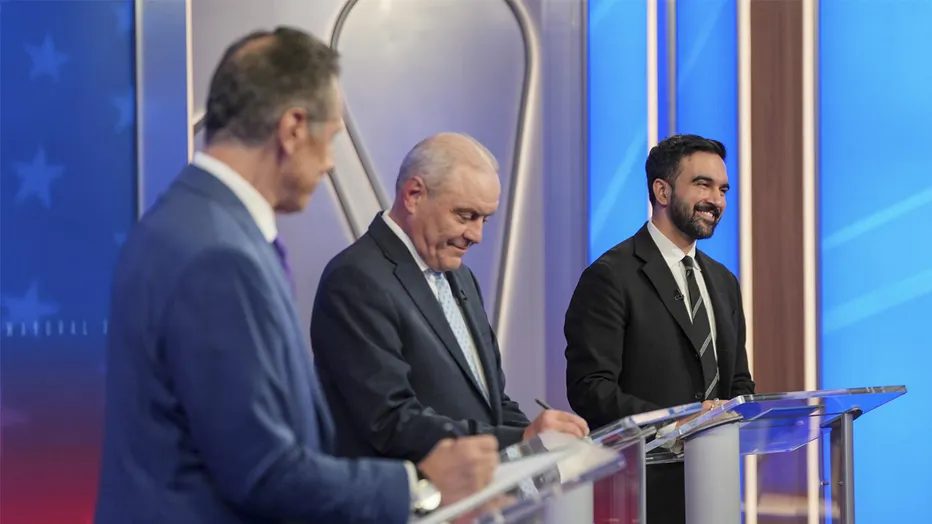FOX 5: Final NYC mayoral debate night before polls open: How to watch, what to know
FOX 5: Final NYC mayoral debate night before polls open: How to watch, what to know
By Adeja Shivonne

The Brief
- The final mayoral debate Wednesday gives Mamdani, Cuomo and Sliwa one last chance to sway voters before early voting starts Saturday.
- Curtis Sliwa faces pressure to drop out as polls suggest Cuomo could tighten the race against Mamdani if he did.
- Mamdani builds momentum with progressives while Cuomo sharpens his attacks and Sliwa gains viral appeal online.
When is the debate?
Wednesday’s two-hour debate, hosted by Spectrum NY1, The City, and WNYC/Gothamist, begins at 7 p.m.
It’s the final major moment before early voting opens Saturday and the last opportunity for each candidate to make their case for the future of New York.
Who won the last debate?
Why you should care:
While no clear winner emerged, analysts say Mamdani held his lead by avoiding major missteps, Cuomo relied on his executive experience, and Sliwa’s offbeat humor and streetwise anecdotes, including stories about his mafia run-ins, made him an unlikely social media favorite.
Ben Max, host of the Max Politics podcast, joined Good Day New York on Friday morning with his analysis of the debate.
When asked if anyone won last night, Max said there were no “game changers” from the debate, meaning “Zohran Mamdani, as the front-runner, had a pretty good debate because he didn’t make any huge gaff and nobody brought him down significantly.”
Max added: “But I did think, in the debate itself, if you just look at how it was debated, Curtis Sliwa had a pretty good night.”
Will Sliwa drop out?
Since the first debate, the political pressure has only intensified.
Several conservative voices, including Trump ally John Catsimatidis and the editorial boards of the New York Post and Daily News, have urged Sliwa to drop out to consolidate anti-Mamdani voters behind Cuomo.
NYC mayoral poll
A new Gotham/AARP poll suggests that if Sliwa exited the race, Cuomo would trail Mamdani by just four points, 44.6% to 40.7%. But Sliwa isn’t budging.
“People who know nothing about politics suggest that everybody who’s going to vote for me is suddenly going to be reborn: We love Andrew Cuomo,” Sliwa said in a viral interview this week, dismissing billionaire Bill Ackman’s calls for him to step aside.
Meet the candidates
Curtis Sliwa (R)
Returning to the mayoral race after his 2021 defeat to New York City Mayor Eric Adams, Curtis Sliwa, 71, brings his tough-on-crime message back to the Republican forefront.
The Guardian Angels founder and radio host is banking on his core base in conservative outer-borough neighborhoods.
Sliwa’s law-and-order platform remains central, and he has wasted no time labeling Mamdani “too extreme for this city,” positioning himself as the voice of traditional values and public safety.
He has focused his campaign on public order and community-focused housing.
Sliwa’s affordability plan
His seven-point housing plan includes converting empty commercial spaces into homes, restoring vacant rent-controlled units, and returning zoning control to local neighborhoods. Sliwa supports hiring thousands of new police officers and reinstating the NYPD’s Homeless Outreach Unit.
On education, he vows to overhaul the system to focus on measurable achievement, restore school safety agents and expand gifted and vocational programs.
Sliwa also pledges to preserve traditional Medicare for retirees, and to improve city sanitation and pest control to promote public health.
President Donald Trump had previously said he wanted two candidates to drop out of the race, fueling speculation about whether Sliwa might step aside to avoid splitting the vote. But Sliwa has dismissed that idea outright.
“Absolutely no way. Under no circumstance,” he said. “You can’t bribe me. You can’t lease me. You can’t rent me. I am running as the Republican candidate.”
Despite the uphill battle in a city that leans heavily Democratic, Sliwa’s name recognition and combative style keep him relevant in the race.
Andrew Cuomo (I)
After conceding defeat in the Democratic primary, former New York Gov. Andrew Cuomo, 67, has officially qualified to run as an independent in the general election, staging a late comeback that could reshape the race.
Cuomo is presenting himself as a steady hand with deep experience, seeking to appeal to moderates, independents and disaffected Democrats wary of both Mamdani’s progressivism and Sliwa’s conservatism.
He has focused his campaign on restoring public safety and affordability.
He calls for adding 5,000 officers to the NYPD and increasing patrols in subways and retail corridors.
Cuomo’s housing plan
On housing, Cuomo supports building across income levels, enforcing rent-stabilization laws and offering tax relief for working- and middle-class residents.
His education priorities include reducing class sizes, expanding after-school programs and addressing teacher shortages.
Cuomo also wants more school-based health centers and expanded community health partnerships to improve access and pandemic preparedness.
Zohran Mamdani (D)
At 34-years-old, Zohran Mamdani stands out as a Democratic Socialist and a rising star in New York City politics. As a state assemblyman, Mamdani surged ahead on a fiercely progressive platform promising rent freezes, fare-free public transit, universal childcare and an unprecedented push for public housing expansion.
His campaign is centered on housing, affordability and equity.
Mamdani’s housing plan
Mamdani’s proposals include freezing rents for stabilized tenants, tripling the construction of permanently affordable housing and creating a citywide Office of Deed Theft Prevention to protect homeowners.
On public safety, Mamdani would form a Department of Community Safety to handle mental health and homelessness responses, while maintaining NYPD staffing but cutting overtime. He’s pledged to disband the Strategic Response Group, which he says has violated New Yorkers’ rights.
Mamdani’s education plan calls for fully funded public schools, free child care for kids under five and major investments in CUNY.
His health plan would expand city hospital funding, reject Medicare Advantage and create outreach teams to connect residents with coverage and care.

